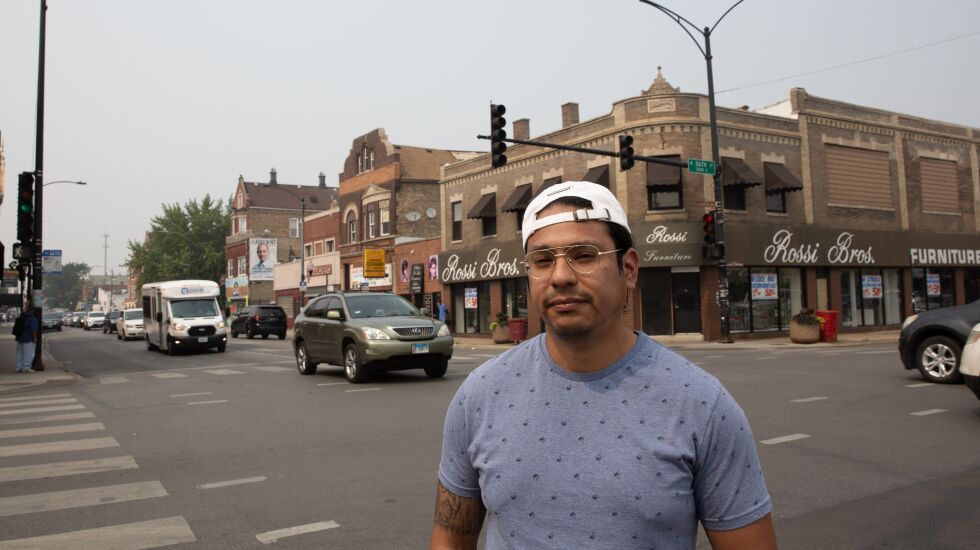
Chicago Police officers have stopped Austin resident Jacquez Beasley at least 12 times since he got his driver’s license three years ago. He’s been ordered out of his car, frisked and had his vehicle searched. Yet officers have never issued the Chicago Park District employee a traffic citation, arrested him or seized any contraband.
Police have pulled over South Lawndale resident José Manuel Almanza Jr., a U.S. Marine Corps veteran who works for a West Side racial justice organization, more than 12 times since 2021. As with Beasley, police have never ticketed Almanza, arrested him or seized any guns or drugs from his car.
South Shore resident Mahari Bell, a marketing consultant and part-time driver for UberEats and DoorDash, has been subject to at least 10 traffic stops. He’s been ordered out of his car, handcuffed and had his vehicle searched — but has never been ticketed, arrested or had contraband seized.
What’s going on here can’t be written off as just unfortunate coincidence, according to a lawsuit filed in federal court last week against the city and the Chicago Police Department, by the American Civil Liberties Union of Illinois.
Seems a lot like the new stop and frisk, and it’s doing little or nothing to stop crime.
The 147-page lawsuit details a list of repeated, invasive traffic stops by police of Beasley, Almanza, Bell and two additional plaintiffs, all of whom are Black or Latino. The plaintiffs were pulled over for minor infractions like a burned-out tail light — or no infraction at all — and were forced to answer questions such as whether they had a firearms owner ID card or where they were going.
In some cases, the lawsuit maintains, the plaintiffs were ordered out of their vehicle while it was searched, then frisked and even handcuffed — yet none of these incidents resulted in even a traffic citation, much less an arrest or seizure of guns or drugs.
And the pattern is far more pervasive than just these five Chicagoans, the lawsuit alleges.
The ACLU analyzed more than 2.6 million traffic stops over six years, from 2016 through 2022, that showed Black drivers in Chicago are four to seven times more likely to be pulled over by police than whites, and Latino drivers are stopped twice as often.
Shockingly, fewer than 1% of the approximately hundreds of thousands of traffic stops CPD made each of those six years led to an arrest or the discovery of illegal drugs or a gun. Illegal drugs were recovered in just 0.3% of the traffic stops, and police seized weapons even less frequently, at a rate of only 0.05%.
“It’s a waste of police resources because they’re not finding drugs and guns in more than 99% of these stops,” Alexandra K. Block, a senior supervising attorney for the ACLU’s Roger Baldwin Foundation, told us. “This doesn’t reduce serious crime.”
Just as troubling, the pattern of repeated, ineffective traffic stops is a serious barrier to building bridges of trust between CPD and communities of color — which makes it harder to work with witnesses who can help to solve murders, carjackings and other serious crimes.
The new stop-and-frisk
“My mother used to tell me, ‘Don’t confuse activity with accomplishment,’” said Ed Yohnka, the ACLU Illinois’ director of communications and public policy. “It’s been about numbers and not improving community relationships.”
The lawsuit comes less than a decade after CPD reached a settlement with ACLU Illinois over similarly disproportionate stops of minority pedestrians, as Sun-Times reporter Andy Grimm reported last week.
The number of traffic stops in Chicago surged after the settlement with ACLU Illinois over stop-and-frisk pedestrian stops, while pedestrian stops fell from a high of 710,000 in 2014 to just 107,000 in 2016.
“It’s an historic and ongoing pattern that keeps repeating itself, from gang loitering to stop and frisk to now mass traffic stops,” Block said.
Beasley said police once pulled him over after he turned into the parking lot at work. As his supervisor watched, officers interrogated Beasley before letting him go.
“I feel that officers see me, a young Black man with dreadlocks, and immediately assume I’m suspicious, even though I have no record, and I’ve never gotten a traffic ticket or even a warning,” Beasley said.
“Many of these stops have been frightening, with police officers approaching my car with a hand on their weapons,” Almanza said. “I think the officers see a brown man driving on the West Side, and they assume I’m up to no good, but I’m just trying to go about my life like everyone else.”
The lawsuit is more evidence that Chicago must ramp up its efforts on policing reform, starting with the selection of a new police superintendent who will send the message that policing reform and effective crime fighting must go hand in hand.
Send letters to letters@suntimes.com







